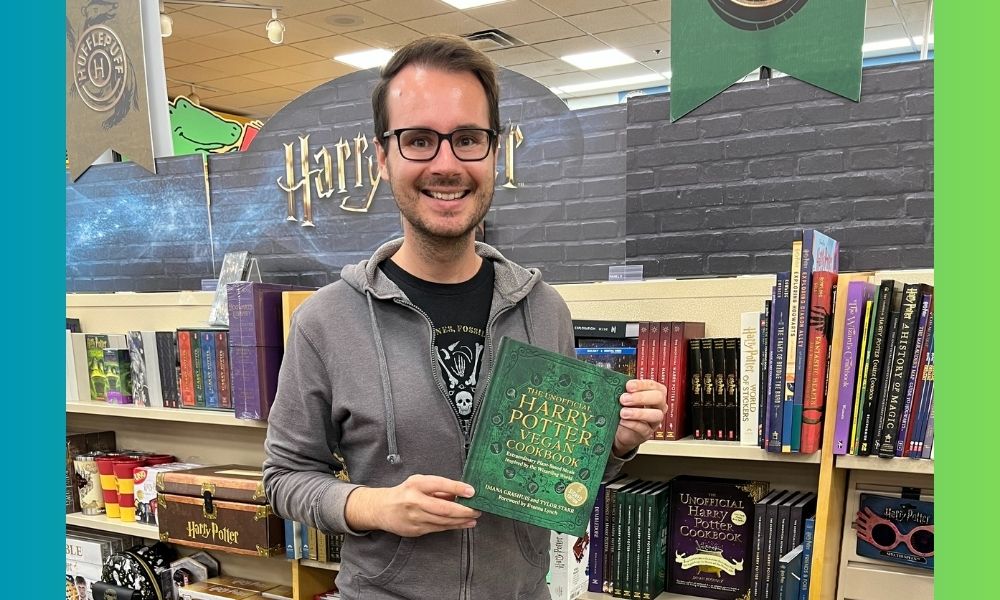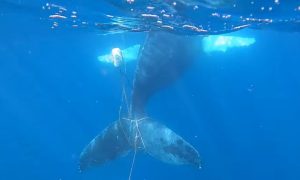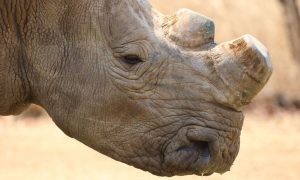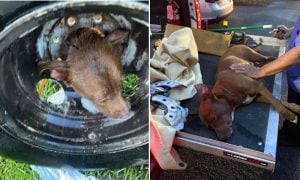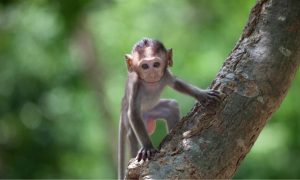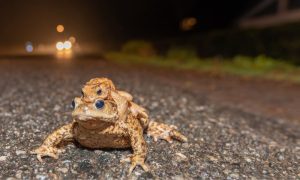The local public library doubled as a refuge and a portal to magical worlds for a young Tylor Starr, while an encounter with a companion cat outside the library’s hallowed walls catapulted Starr into activism for animals — in both the fantasy and “Muggle,” or human, world.
Starr, who started his activism career with People for Ethical Treatment of Animals (PETA) and later went on to found the Protego Foundation and co-author “The Unofficial Harry Potter Vegan Cookbook,” recalled pivotal moments in his life that led him clearly along a path he pioneered.
One life-changing moment involved discovering the world of Harry Potter, a now-famous teen wizard whose travails through the magical world of Hogwarts have fascinated people since 1997, when J.K. Rowling’s first book in the series was published.
Another childhood moment involved a young Starr helping his family pull a community cat’s litter of dead kittens out of the insulation of an adjacent trailer in the mobile home park where he lived. Starr, heartbroken, then went inside to a chicken dinner and felt a profound sense of confusion about why his family was grieving the deaths of one species while glossing over the demise of another.
His love of animals led him in college to work for PETA. And when Starr needed to recharge from that emotionally-laden work, he created a self-care routine by giving himself weekends at Universal Studio’s Harry Potter-themed parks.
Enter our world’s rendition of Butterbeer, an iconic drink from the world of Harry Potter that the park’s employees made with heavy cream from cows that Starr found, to his shock, could “not” be made vegan. Starr asked numerous employees if he could have the drink, without the cream, and found to his dismay that contract details prohibited employees from in any way altering the drink.
Starr launched a years-long campaign and ultimate victory through the Protego Foundation, a nonprofit organization Starr founded to examine animal rights in Rowling’s wizarding world that since has inspired fans to also advocate for the rights of the magical creatures in this world.
Starr, who donated several copies of “The Unofficial Harry Potter Vegan Cookbook” for LFT’s 10-year celebration, spoke with Lady Freethinker about his journey into taking action for animals, how the exploitation and abuse of animals in the wizarding world reflects their plight in our world, why every victory in animal advocacy matters, and the importance of having a self-care routine so activists can stay in the fight for the long-haul.
Answers combine an interview, several of Starr’s Instagram posts, and the Protego Foundation website and have been edited for length. To learn more about Starr, who also co-hosts the Chickpeeps podcast and the Radicals and Revolutionaries podcast, check out his website here.
A Q&A with Tylor Starr: Co-Author of “The Unofficial Harry Potter Vegan Cookbook”
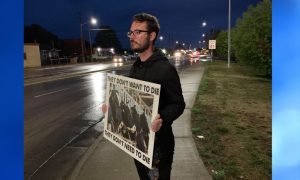
(Courtesy of Tylor Starr)
Tell us about your entry into the world of animal rights.
I was born in Greeley, Colorado, where the largest employer is a slaughterhouse. I grew up seeing animals trucked in to slaughter. Once there was a crash of a transport of cows, and I remember thinking, “Poor cows.” It was heartbreaking for my family and me.
But it wasn’t until I was 13 years old, when an outdoor cat who was not spayed had kittens who died in the insulation of the trailer next to ours, and then we went inside and ate chicken, that I first questioned why we cry about one species and not another.
When I went to college, it was the first time I could be myself and live the values I wanted to: to stop wearing animals’ skins and to stop eating them. I watched Earthlings and realized I had no idea the sheer amount of suffering I was contributing to. I started learning about activists, and I started an animal rights group at the University of Northern Colorado. That group became my life.
I became an activist in 2010, when I turned 18. I went vegan in 2012, and I worked for PETA for six years. I started with an animal rights tour with PETA that allowed me to travel the country promoting vegan living and the fight for animal rights.
Can you tell us more about what you mean by the term “animal rights?”
I define animal rights as animals having the inherent right to have what is important to them. Dogs don’t need the right to vote, for example, but dogs do deserve to live lives that involve what is important to them. I want to ensure that when I talk about animal liberation or being vegan, I am centering the conversation on the cruelty the animals endure.
When did Harry Potter enter the mix of what was important in your own life?
I grew up at the perfect time to be a Harry Potter fan. The first book came out when I was in third grade, and my teacher read it to us. It’s been with me ever since — since 2000. I can barely remember a time when Harry Potter wasn’t in my life. At school, I was always known as The Harry Potter Kid. I grew up in a low-income family, so I really relied on my local library, and I have learned so many lessons from Harry Potter.
It’s one of those series that has meant different things to me at different times in my life. After I learned more about animal rights, it started to make more sense why Hermione was fighting for the elves or was upset about dragon usage. Those talking points started to resonate with me and other fans, and I realized we could now connect what resonates in a fictional world to what’s here now.
Can you tell us about the parallels you see for animals in the wizarding world and this world?
The goal of the Protego Foundation is to create a wizarding fandom that is more considerate of the rights, feelings, and treatment of all creatures, regardless of species, size, or magical ability. The magical creatures in the Muggle (human) world — like cats, dogs, pigs, cows, and snakes — are no different than the Pygmy Puffs, Nifflers, and elves. Just as Hermione fought the use of elves, we fight for creatures in the Muggle world to be able to live a life free of abuse and exploitation. Like animals here, the fantasy animals are subjected to inhumane treatment and neglect, beaten into submission, and have food withheld to perform unnatural acts for “amusement.”
I don’t think J.K. Rowling was 100 percent intentional about her portrayal of animal rights. But The House Elf Liberation Front parallels the Animal Liberation Front in the UK. There’s also the issue of cognitive dissonance (Editorial Note: when you say you believe one thing but do something else). In Harry Potter, there are people who care about animals but subjugate them. Hagrid is a good example of a character who loves animals but is wearing fur and leather, and he didn’t support the liberation of the elves.
Newt Scamandar is a character who is as vegan as possible. He didn’t want a wand made out of animals, which set into motion the first wizarding depiction of animal rights. The Fantastic Beasts series was fantastic because there wasn’t that cognitive dissonance: Newt would not kill the animals in his care.
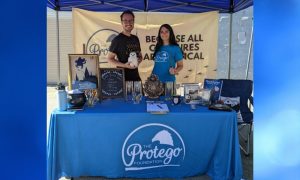
(Courtesy of Tylor Starr)
Within the scope of massive suffering for animals today, why do victories like vegan Butterbeer matter so much?
When we talk about animal liberation, it’s not this giant domino effect. It’s happening in incremental victories.
On the surface, I can see how the Butterbeer victory could seem kind of silly. But this is the most iconic drink in Harry Potter and theme park history! Getting Universal to sign off on foamless Butterbeer took more than 10,000 petition signatures, hundreds of signed postcards to the Senior Vice President of Food and Beverages at Universal, two Harry Potter actors publicly voicing support for the campaign, and dozens of complaints to Universal’s customer service. There were so many “wands in the cauldron!”
The campaign let the companies know they had missed a simple opportunity to provide an inclusive, animal-friendly option. They couldn’t ignore us when we showed up on their doorstep asking for vegan Butterbeer! When I heard that vegan Butterbeer could finally be served, I spent $900 on a flight to get to the park and be the first guest to try it. I don’t think I slept for 36 hours!
This might seem like a small thing to some, but it was four years of work for me. It also put The Protego Foundation on the map, so it was a huge moment.

(Courtesy of Tylor Starr)
The Protego Foundation includes non-vegan members: Can you talk about that?
I think we (vegans) shoot ourselves in the foot when we don’t welcome people into our circles. Our movement is now being classified as one where you have to be “perfect” — and it’s the only one of the social justice movements that is. I like to welcome people at whatever place they are.
Anything you’d like to say to activists on the importance of a self-care routine?
As an animal rights activist, you are putting so much of yourself on the line to help animals you will never meet — but you do it because it’s the right thing to do. I know from personal experience what it feels like to be stretched thin and to know what’s on the line when you’re not working for the animals.
But I also knew I needed to prioritize my mental health, and that’s when I started going to Universal parks. I would tell myself, “I’ve worked really hard, now I’m going to go to these parks, ride some rides, and go back to work refreshed because that’s better for the animals.”
One of the most important things you can do to play your part in making change is by sustaining yourself. By caring for your mental health, you are able to stay in this movement for longer, and you will be able to make long-standing change for animals. We need people in this movement for as long as possible, and we need people to give as much as they can, when and where they can, in a healthy way.
You have to be able to find your own space for happiness. The best activist finds time for themselves while working for the animals.
It’s exhausting to care. Be kind to yourself.

